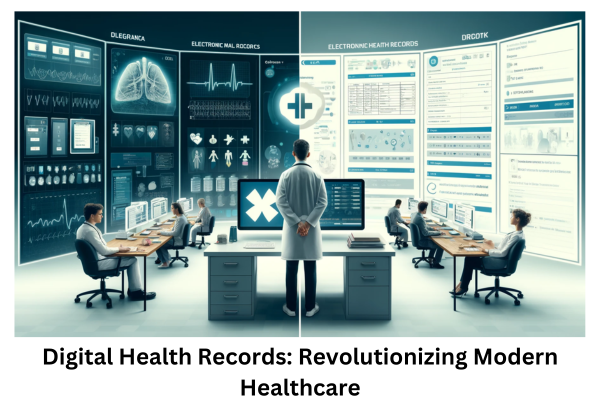In today’s fast-paced healthcare environment, digital health records (DHRs), also known as electronic health records (EHRs) or electronic medical records (EMRs), are transforming the way patient information is managed and utilized. By transitioning from traditional paper-based systems to digital formats, healthcare providers are enhancing accuracy, accessibility, and coordination in patient care. This comprehensive guide explores the evolution, benefits, challenges, and future prospects of digital health records.
What Are Digital Health Records?
Digital health records are electronic versions of a patient’s medical history. They include vital information such as diagnoses, treatment plans, medications, and test results. Unlike paper records, digital health records are stored electronically, providing a more streamlined and efficient way to manage patient data.
Evolution of Health Records
1. Paper-Based Records
Before the digital era, patient records were maintained on paper. While this method was functional, it had significant drawbacks, including the risk of loss, damage, and difficulty in sharing information between different healthcare providers.
2. Introduction of Electronic Records
The shift to electronic health records began in the late 20th century. Early EHR systems were primarily used for administrative tasks like billing and scheduling. Over time, these systems evolved to include comprehensive clinical data, enabling better management of patient care.
3. Modern EHR Systems
Today’s EHR systems offer advanced functionalities, including clinical documentation, laboratory results, and patient communication tools. They are designed to enhance care quality, streamline workflows, and improve patient outcomes.
Benefits of Digital Health Records
1. Improved Accuracy and Safety
Digital health records minimize errors associated with handwritten notes. EHR systems incorporate validation checks and alerts to prevent medication errors and other issues, improving patient safety. For example, drug interaction alerts notify healthcare providers of potential adverse reactions, enhancing overall care quality.
2. Enhanced Accessibility
One of the major advantages of digital health records is their accessibility. Authorized healthcare professionals can access a patient’s complete medical history from any location, facilitating coordinated care. This accessibility is crucial in emergencies and supports telemedicine services, allowing for remote consultations and continuous care.
3. Efficient Data Management
EHRs streamline data management by reducing the need for physical storage and minimizing the risk of lost records. Healthcare providers can quickly retrieve, update, and share patient information, which improves efficiency and productivity. Automated features for scheduling, billing, and documentation further enhance operational efficiency.
4. Increased Patient Engagement
Patient portals associated with EHR systems give patients access to their health information. Through these portals, patients can view their records, track their health status, schedule appointments, and communicate with their providers. This increased engagement promotes adherence to treatment plans and better health outcomes.
5. Advanced Data Analytics
EHR systems generate valuable data that can be analyzed to gain insights into patient populations, treatment outcomes, and healthcare trends. This data-driven approach supports evidence-based medicine, allowing healthcare providers to make informed decisions and identify areas for improvement. Population health management and research benefit greatly from the aggregated data in EHR systems.
Challenges of Digital Health Records
1. Data Privacy and Security
The digital nature of health records raises concerns about data privacy and security. Ensuring that patient information is protected from unauthorized access and breaches is critical. Healthcare organizations must implement robust cybersecurity measures, including encryption, access controls, and regular security audits.
2. Interoperability Issues
Interoperability remains a challenge in the realm of digital health records. Different EHR systems may use various formats and standards, making it difficult to share information seamlessly across different platforms. Ongoing efforts aim to develop standardized protocols and improve interoperability.
3. Training and Usability
Effective use of EHR systems requires proper training for healthcare professionals. Issues with poorly designed interfaces and inadequate training can lead to decreased productivity and user frustration. Investing in user-friendly systems and comprehensive training is essential for maximizing the benefits of EHRs.
4. Cost and Implementation
Implementing EHR systems can be costly, particularly for smaller healthcare providers. The expenses associated with software acquisition, hardware, training, and ongoing support can be significant. Balancing these costs with the long-term benefits of digital health records is crucial for healthcare organizations.
5. Legal and Ethical Considerations
Digital health records also raise legal and ethical concerns. Issues related to data ownership, patient consent, and potential misuse of information must be addressed. Establishing clear policies and ethical guidelines is necessary to protect patient rights and ensure compliance with regulations.
The Future of Digital Health Records
1. Artificial Intelligence (AI) Integration
AI is expected to enhance digital health records by providing advanced data analytics, predictive modeling, and decision support. AI algorithms can analyze patient data to identify patterns, predict outcomes, and suggest personalized treatment plans, improving the accuracy and efficiency of care.
2. Blockchain Technology
Blockchain technology offers a secure and transparent method for managing digital health records. By creating an immutable and decentralized ledger, blockchain can enhance data security, streamline data sharing, and ensure the integrity of patient information.
3. Improved Interoperability
Future developments will likely focus on improving interoperability between different EHR systems. The creation of standardized protocols and data exchange frameworks will facilitate seamless information sharing and better care coordination.
4. Patient-Centric Innovations
The next generation of EHR systems will focus on increasing patient engagement and empowerment. Innovations such as personalized health dashboards, real-time monitoring, and integration with wearable devices will provide patients with a more comprehensive view of their health.
Conclusion
Digital health records are revolutionizing healthcare by enhancing accuracy, accessibility, and efficiency in managing patient information. Despite challenges related to data privacy, interoperability, and cost, the benefits of EHR systems are substantial. As technology continues to evolve, digital health records will play a critical role in shaping the future of healthcare, improving patient outcomes, and supporting a more connected and efficient healthcare system.
For more information on how digital health records are transforming healthcare and enhancing patient care, visit WellBeingProTips.com. For more Visit Our Tiktok, Twitter, and Pinterest.

